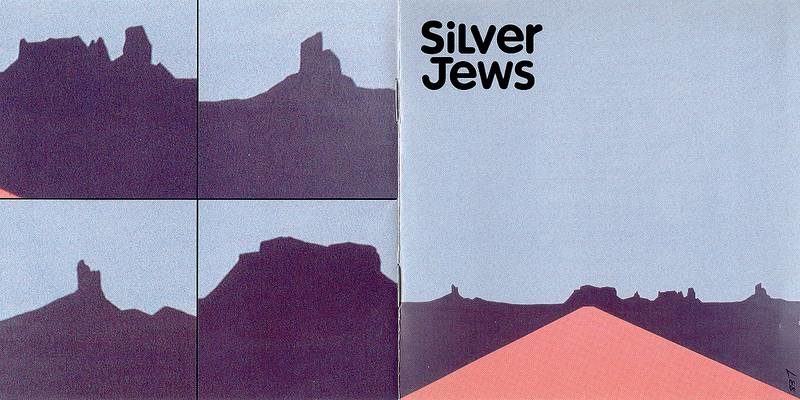Artful Americana
20 Years Later, The Silver Jews’ ‘American Water’ remains a profoundly surreal document of otherness at home

Outside of the outlaws and the no depression crowd, there are scant subsets of Americana where “otherness” is celebrated and revered. Growing up Jewish, that genre was even further from speaking to me, from folding me in. Sure, we had Kinky Friedman, while Leonard Cohen had that one tune, “Ballad of an Absent Mare” and played with Charlie Daniels on Songs of Love and Hate.
Other than that, though, it was hard to find a connection between the staid and somber profundity of my culture and American music. Then I heard American Water.
Like Gram Parsons before him, Silver Jews mastermind and sole member David Berman came from privilege— but he used that privilege to fold his weirdness into a genre he cared for deeply. The son of a opposition-research heavy right-wing PR agency head (Richard Berman, owner of the notorious Berman And Company), David saw Silver Jews as an outlet to turn his surrealist poetry about the American landscape into muckraking slacker odes. Together with Stephen Malkmus, he elevated the project into a low-key subversion of the American songbook, filtered through the snarky mind of a brilliant underdog.
American Water remains The Joos’ masterpiece not just because of its sparkling production (RIP, Williamsburg’s Rare Book Room), but because of its ability to capture a surreal perspective on the American landscape in a vessel of biting cynicism and genuine romance. Berman shares Neil Young’s knack for crafting the perfect line, and American Water is full of ’em— “Won’t soul music change now that our souls have turned strange?” may be my favorite.
These lines come early and often. We open with “Random Rules” to find Berman in Henry Miller mode, “slowly screwing my way across Europe”. The tune peaks with a self-referential epiphany, almost in the spirit of Cohen’s Zen koans: “I asked the painter why the roads are colored black/He said, ‘Steve, it’s because people leave and no highway can bring them back.’”
While we’re still processing that profundity, the surreal turns comical: “So if you don’t want me, I’ll promise not to linger/But before you go, I’ve gotta ask you, dear, about that tan line on your ring finger.”

Humor and sorrow, togetherness and loneliness are all traveling companions on American Water, piled into the same car and in no particular hurry to get anywhere.
The next tune, “Smith and Jones Forever” deserves its rightful place in the canon of treasured American story songs (and possibly murder ballads, depending on your interpretation of its words). It’s a perfect amalgamation of eloquently recited imagery, building toward a revelation in the last verse that urges the listener to go back and reprocess what they’ve just heard. Berman’s baritone turns sinister here as he intones: “Build a stage for autumn’s bitch/They walk the alleys in duct tape shoes/ They see the things they need through the windows of a hatchback/The alleys are the footnotes of the avenues.”
It’s hard not to read the tune “Federal Dust” differently knowing what we learned about Berman’s family life when he disbanded The Joos in 2009. When Berman revealed that his father was Richard Berman, owner infamous Berman and Company, a powerful PR firm with a roster of tremendously anti-animal welfare, anti-environment, big tobacco, big fast food clients, David laid it all out there pretty bluntly: his father was an evil man.
“I went off to hide in art and academia,” Berman explained in a now deleted blog post on the Drag City message board. “I fled through this art portal for twenty years. In the mean time my Dad started a very very bad company called Berman and Company.”
“He props up fast food/soda/factory farming/childhood obesity and diabetes/drunk driving/secondhand smoke. He attacks animal lovers, ecologists, civil action attorneys, scientists, dieticians, doctors, teachers. His clients include everyone from the makers of Agent Orange to the Tanning Salon Owners of America. He helped ensure the minimum wage did not move a penny from 1997-2007! The worst part for me as a writer is what he does with the English language.”
Berman went on to say that he hoped Silver Jews would undo a small iota of the evil his father unleashed into the world, and once he learned it wouldn’t, he called the project quits. He proposed muckraking as a next career path. If you’ve read his fantastic poetry collection, Actual Air, you’ll understand just how powerful his words can be without music set to them, too.
All of this is important when considering “Federal Dust”, in which the singer lists off cities that do or don’t smoke, that do or don’t vote, that do or don’t dream. It’s all very ambiguous until we consider this revelation about Berman’s background, which also punctuates the coda line: “not much water coming over the hill.” The implication that water, this natural, elemental life force has been tapped before it even gets to us by Capitol Hill, suddenly has a new level of sinister to it, uglier and more profane than our killers in “Smith and Jones Forever”, but no less American.
“People” remains one of the most accessible entry points into the band’s catalogue, not just because it’s catchy and Stephen Malkmus’ presence starts to become more audible (old buddies with Berman since his UVA days and a member of the band from the beginning), but because it offers some optimism about the value of community and sharing, only mildly cautionary (“people be careful not to crest to soon”).
Knowing what you know about Berman’s father, try to hear this line from the groovy “Blue Arrangements” as anything less than a literal scene: “And the kids in the corner all covered in dirt/Caught trespassing under the moon/My father came in from wherever he’d been/And kicked my shit all over the room”
“Blue Arrangements” works as a centerpiece for the record because it marries the somber, reflective sense of otherness with a more laissez-faire, slacker vibe of existential detachment.
Berman “loves your amethyst eyes, and your Protestant thighs/you’re a shimmering socialite jewel.” Again, just like Cohen (“your thighs are a ruin” in “Stranger Song”) Berman sees beauty in the vulnerability that his conquest of this woman has put before him. The otherness is palpable, as is the evocation of his conquest’s faith as it relates to society and stature. This song also contains a line that ties that otherness into a perspective on depression that Berman has mentioned possessing in interviews before, a trait that is not uncommon among us Ashkenazi Jews:
“I took these blue arrangements and threw them in the sea/ When older waves from older caves brought them back to me.”
He’s tried coping, but suppressed past experiences won’t go away. That verse ends with “I took these blue arrangements and stored them on a shelf/With coins on the mantle and time in a candle, in the end a boy raises himself,” seemingly alluding to his parental relationship again.
Things get more objectively sparse and beautiful, but no less heady, for the first half of “We Are Real”—a smattering of directions to an unmentioned destination, more rhetorical profundities: “Is the problem that we can’t see/Or is it that the problem is beautiful to me?” that turn quickly into humorous wit: “Birds of Virginia/Flying within ya/Like background singers, they all come in threes.”
When Malkmus comes in for some solo lines on “Send In the Clouds” and the song finally picks up, the two as a question “why can’t monsters get along with other monsters?” and kick around a made-up phrase —“soi disantra” before dissolving into a freakout. The question still resonates as a frustrating equalizer and a reminder that nothing happens when everyone plays the role of antagonist. Another classic on an album full of them.
Berman knows that his perspectives are not mainstream, and he acknowledges the divide between sanctioned American narratives and his worldview on the album’s most bluntly philosophical track, “Like Like the the the Death”, when he cooly dismisses “MGM endings”, speaks on the elemental revelations of watching your mom kill an animal, and asks a foundational philosophical question: “Why is there something instead of nothing?”
And change the bits between the asterisk in this paragraph with typos and capitalization mistakes :
The otherness that comes with growing up Jewish in America resurfaces on “Buckingham Rabbit”—”I’ve been lonely since she found Christ”—and the song goes on to speak for those who feel that they can lose themselves in religion, work or whiskey. He sings of a couch in the back of the bar where people go to talk to “the honkey-tonk psychiatrist” here, then goes into a catchy piece of nostalgic country, *“Honk If You’re Lonely”, so jarringly jubilant you’ll swear it was a cover.
This brings us to the album’s stunning closer, “The Wild Kindness”,and its evocative closing statement—“I’m gonna shine out in the wild kindness/and hold the world to its word.” The evils and hypocrisies Bergman has observed have been rendered powerless with this line, while the powers of the natural landscape have not yet been defeated.
Its imagery also brings to mind the fact that, when Berman retired the band, they played their final show at Cumberland Cave in McMinnville, Tennessee. The idea of retreating into solitude, and the cave image, reverberates far beyond “Blue Arrangements”, or that final show, to the core stories of Judaism. The baby Abraham hid with his mother in a cave for the first ten years of his life, for starters. Meanwhile, one of the most famous stories in The Talmud tells of a Rabbi, Shimon Bar Yochai, who hid in a cave with his son to hide from the Romans and keep studying The Torah.
This story, and “The Wild Kindness”, both tap into the idea that being “the other”, that being the outcast, often makes us feel alone or isolated until we reconnect with the powerful energies embedded in the natural world. Once we can lock into those, we are able not only to hold the world to its word, but to share nature’s majesty in the places where it still triumphs over man’s inequities.
Maybe American Water’s greatest triumph, then, is that it catalogues our American inequities, and natural splendor’s power over them, to find beauty even in the ugliness. 20 years later, that’s a trick we still ought to play on the world more often.




